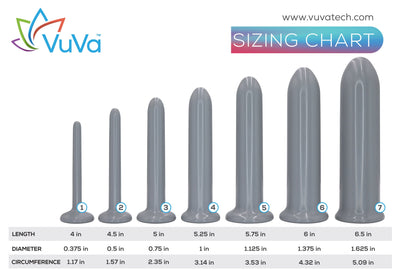
| Tara Langdale
Do Trans Women Have to Dilate Forever? A Realistic, Trauma-Informed Guide to Life After Vaginoplasty
If you've undergone or are preparing for gender-affirming vaginoplasty, one of the biggest questions on your mind might be:
"Do I have to dilate forever?"
It’s a valid concern—and one that many transgender women and transfeminine people share. The answer is both medical and personal. The truth is, dilation is essential, especially in the first year, but it doesn’t have to be a lifelong burden. With the right tools, a trauma-informed approach, and good support, dilation can shift from something you “have to” do into a process of healing, reconnection, and even empowerment.
In this guide, we’ll break down the real timeline for dilation, address emotional barriers, and introduce safe, holistic tools—like the best-selling VuVa Magnetic Dilators, created by a woman who knows what painful dilation feels like.
Let’s dive in.
What Is Vaginal Dilation and Why Is It So Important?
After vaginoplasty, the body sees the newly created vaginal canal as a wound—and like any wound, the body wants to close it. That’s why dilation is critical. Without it, you risk vaginal stenosis, a condition where the neovaginal canal narrows, shortens, or becomes too tight for penetration, exams, or daily comfort.
Dilation does three things:
-
Preserves depth and width of the neovagina
-
Improves scar mobility and reduces adhesions
-
Supports sensory adaptation and long-term tissue flexibility
The first 12 months after surgery are when your tissues are most prone to scar formation and closure. That’s why surgeons prescribe strict dilation protocols during this time—and why consistency is crucial.
Do Trans Women Have to Dilate Forever?
Let’s clear this up:
No, most trans women do not need to dilate forever at the same frequency they do in the first year.
Here’s a general timeline:
-
Weeks 1–6: 3–4 times a day
-
Weeks 6–12: 2–3 times a day
-
Months 3–12: 1–2 times a day or 3–5 times a week
-
After 1 Year: 1–3 times per week for maintenance (sometimes less)
If you’re sexually active with vaginal penetration, that may count as a substitute for some dilation sessions, depending on frequency and comfort. But remember: sex doesn’t always maintain depth, especially if it’s inconsistent or not deep enough. So even in long-term phases, occasional dilation is advised—just not daily for most.
However, the exact duration depends on your body, your healing, your surgical technique, and your lifestyle.
What If Dilation Hurts or Triggers Dysphoria?
Dilation isn’t just a physical process—it’s emotional and psychological, especially for transgender women navigating trauma, medical mistrust, or gender dysphoria. Many trans women describe dilation as:
-
Emotionally distressing
-
Painful or uncomfortable
-
Difficult to prioritize
-
Triggering for past trauma
That’s why it’s essential to use tools and approaches that center comfort, consent, and choice.
A Holistic, Trauma-Informed Tool: VuVa Magnetic Vaginal Dilators
Pain during dilation can create avoidance, leading to narrowing or even loss of neovaginal depth. That’s why comfort matters—and it’s exactly why VuVa Magnetic Dilators were created.
Founder Tara Langdale-Schmidt created VuVa after suffering from painful sex and pelvic floor dysfunction following surgery. Frustrated by hard plastic dilators that felt clinical, invasive, and ineffective, she designed a better option: a soft, body-safe vaginal dilator set embedded with therapeutic magnets.
Why VuVa is different:
-
Embedded with neodymium magnets to increase blood flow and reduce inflammation
-
FDA-cleared and hormone-free
-
Trusted by over 250,000 women and trans individuals
-
Gentler and smoother than standard dilators
-
Designed to promote relaxation and healing
VuVa is not just about size progression—it’s about healing through comfort, at your own pace, in your own space.
Top VuVa Dilator Sets for Post-Vaginoplasty Support
VuVa Full Magnetic Set
Includes 5 gradually sized magnetic dilators, perfect for transgender women in early or mid-recovery. It allows for gentle progression to preserve depth without trauma or pain.
VuVa Sizes 3, 4, 5, 6 Magnetic Set
This curated set is specifically helpful for trans women with moderate stenosis, vaginal atrophy, or long gaps between dilation. It targets the sizes most commonly used for maintenance or reentry after discomfort.
You can explore both at www.vuvatech.com and choose the best set for your body and your needs.
Common Dilation Struggles and How to Overcome Them
1. Pain or Burning
Use a medical-grade, water-based lubricant. Magnetic dilators can help ease inflammation. Apply heat beforehand (warm compress or bath) to relax muscles.
2. Tight Pelvic Floor Muscles
Fear or trauma can cause the pelvic floor to contract involuntarily. A pelvic floor therapist—preferably one with trans experience—can teach you how to relax and lengthen those muscles safely.
3. Numbness or Lack of Sensation
Some trans women report numbness in the neovagina post-op. This can affect sexual pleasure and body awareness. Sensate mapping, massage, and gentle movement with dilators can help reconnect you to sensation.
4. Avoidance or Depression
If you skip dilation due to emotional distress, you're not alone. Consider affirming therapy or support groups. Use soft music, candles, or affirmations. Dilation can become a healing ritual, not a punishment.
Understanding Surgical Variations and Their Impact on Dilation
Not all vaginoplasties are the same. Your surgical technique will influence how you heal and how you dilate.
-
Penile inversion: Most common; requires consistent dilation early on
-
Peritoneal graft (Davydov flap): May require more tailored dilation due to two healing incisions
-
Sigmoid colon vaginoplasty: Different tissue type, lower risk of stenosis but still requires maintenance
Talk to your surgeon about your specific needs—and adjust your protocol with guidance from your pelvic health provider.
Sex and Dilation: What Counts?
Once your surgeon clears you for sexual activity (often 12+ weeks post-op), vaginal penetration may partially substitute for dilation. But here’s the catch: it depends on depth, frequency, and comfort.
-
Light or shallow penetration may not maintain full depth
-
Infrequent sex will not replace structured dilation
-
Painful sex does not help—seek help before relying on it as a substitute
If you're having regular, deep, comfortable sex? Dilation may reduce to 1–2 times weekly. But always listen to your body and maintain a baseline of care.
Reframing the Question: Dilation as Self-Connection
Instead of asking, "Do I have to dilate forever?"
Ask:
"What does my body need to feel good and stay functional long term?"
Healing is not about punishment—it’s about protection. Dilation is about preserving your freedom, whether that’s comfort during sex, routine checkups, or body autonomy.
Long-Term Maintenance Tips
-
Stick to a consistent maintenance schedule after year one (1–3x/week)
-
Keep one comfortable dilator on hand—VuVa’s mid-size dilators are ideal
-
Pair dilation with lubrication, mindfulness, and relaxation
-
See a pelvic floor therapist if pain or tightness returns
-
Continue lubricated penetration (if sexually active) to help maintain results
Final Thoughts: Healing is a Journey, Not a Deadline
No, you won’t always have to dilate every day.
Yes, you’ll likely need to do it occasionally for maintenance.
And yes—you can feel at home in your body again.
With affirming support, tools like VuVa Magnetic Dilators, and trauma-aware care, dilation becomes less about obligation and more about healing, resilience, and reconnection.
You are not alone. You are not broken. You are becoming.
Explore Tools for Healing
Ready to take control of your dilation journey with comfort and confidence?
Discover the VuVa Full Magnetic Set or the 3,4,5,6 Magnetic Set now at
www.vuvatech.com












